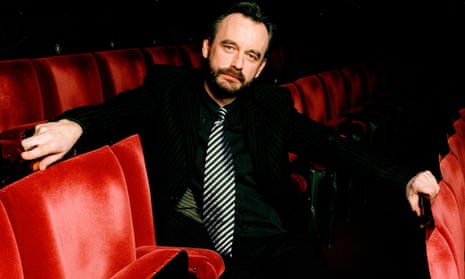John Berry, the artistic director of the beleaguered English National Opera, is leaving the company with immediate effect after 20 years, following months of rumbling controversy about the future of the company and its Arts Council funding, and a string of senior resignations.
The company lost almost a third of its funding from Arts Council England (ACE) last year and was placed in special measures by the council in February. It was also warned that unless its business model improved it could face being dropped permanently from the national portfolio of centrally funded arts institutions.
Although he is leaving garlanded with praise from senior figures on the board, Berry’s departure comes six months after a leaked letter from the outgoing chairman, Martyn Rose, in which the businessman wrote: “For the very survival of the ENO, Berry must leave, preferably soon.”
Rose’s departure was swiftly followed by that of the executive director, Henriette Götz. Edward Gardner, the widely admired music director, having extended his contract several times, also finally took his leave of the company last month after conducting the last night of The Queen of Spades.
Rose welcomed the news of Berry’s departure, saying the ENO needed “a fresh artistic vision and an improved business model”.
“The opportunity to bring in new creative talent and give the ENO a much-needed change of direction is a vital step towards safeguarding the future of this much-loved British institution and ensuring that its productions remain the envy of the world,” he said.
However, the music critic Norman Lebrecht described the news as “a miserable day” and predicted that Berry’s reign would be remembered as “the glory years”.
“Four months ago, in an unprecedented show of solidarity, the heads of all the world’s major opera houses urged Arts Council England get behind John Berry, calling him ‘one of the most creative forces in opera, consistently producing important new work’.
“This morning, John Berry was pushed out by a long-running ACE putsch, in an unstated exchange for longterm ENO funding. It’s a great day for mediocrity, bureaucracy and Little Englishness, a miserable day for artistic vision and ambition.”
Sir Peter Jonas, the former director of the company, said the ENO had lost “an effective and trenchant advocate”. In a comment posted on Lebrecht’s peppery Slipped Disc blog, Jonas warned that anyone taking on the job would have to produce exciting and adventurous work, but also stand up to “the potentially suffocating ignorance of the Arts Council ‘pen pushers’”.
Berry, whose artistic brilliance is admired but whose people skills are questioned by his peers, leaves after a particularly successful season, with four- and five-star reviews and full houses for many productions including The Mastersingers of Nuremberg, and a star-studded concert performance of Stephen Sondheim’s Sweeney Todd with Emma Thompson and Bryn Terfel. He is also credited with luring the renowned film director Mike Leigh to direct his first opera, Gilbert and Sullivan’s The Pirates of Penzance, which pleased audiences more than the critics.
The company, which performs in English, has a noticeably younger and more casual audience than its grander rival at the Royal Opera up the road in Covent Garden, but it also has to fill one of the largest theatres in London, the magnificent but cavernous Coliseum.
Berry, who was made a CBE last year, originally joined the company in 1995 as a casting director, and became artistic director in 2005.
“My work is now done,” he said in the statement from the company announcing his departure, which included tributes to his artistic vision from the ENO’s acting chairman, Harry Brünjes, its president, Sir Vernon Ellis, and Darren Henley, the chief executive of ACE.
“ENO is today regarded as one of the most creative forces in opera,” Berry said. “The decision feels right to leave at the end of a hugely successful season both from an artistic perspective and in terms of audience numbers. ENO is an institution that has an international reputation for producing important new work, recognised by opera awards won at the Oliviers earlier this year and the recent Royal Philharmonic Society Music Award for Opera and Music Theatre.
“We played to packed houses for Sweeney Todd – over half the audience had never visited the London Coliseum before – and we welcomed record numbers to see The Pirates of Penzance on stage and in cinemas across the UK.
“After eight seasons leading the company artistically and as the award-winning 14-15 season comes to a close, I am looking forward to spending the summer deciding on my next role. I look forward to remaining involved with ENO in the future, as an audience member and supporter.”

Comments (…)
Sign in or create your Guardian account to join the discussion